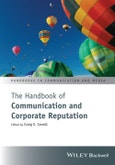With the latest insights from the world of communication studies into the nature of corporate reputation, this new addition to Wiley-Blackwell’s series of handbooks on communication and media reflects the growing visibility of large businesses’ ethical profiles, and tracks the benefits that positive public attitudes can bring.
- Serves as the definitive research collection for a fast-growing field featuring contributions by key international scholars
- Brings together state-of-the-art communication studies insights on corporate reputation
- Identifies and addresses the lacunae in the research literature
- Applies new theoretical frameworks to corporate reputation
Table of Contents
About the Editor ixNotes on Contributors x
Acknowledgments xxvi
1 Corporate Reputation and the Multi-Disciplinary Field of Communication 1
Craig E. Carroll
Section 1 Communication Disciplines of Reputation 11
2 Corporate Reputation and the Discipline of Public Opinion 13
Cees B.M. van Riel
3 Corporate Reputation and the Discipline of Interpersonal Communication 20
Sherry J. Holladay
4 Corporate Reputation and the Discipline of Organizational Communication 30
Robyn Remke
5 Corporate Reputation and the Discipline of Advertising 40
Nora J. Rifon, Karen Smreker, and Sookyong Kim
6 Corporate Reputation and the Discipline of Corporate Communication 53
Peggy Simcic Brønn
7 Corporate Reputation and the Discipline of Public Relations 62
Judy Motion, Sally Davenport, Shirley Leitch, and Liz Merlot
8 Corporate Reputation and the Discipline of Management Communication 72
James S. O’Rourke
9 Corporate Reputation and the Discipline of Communication Management 81
Anne Gregory
10 Corporate Reputation and the Discipline of Integrated Marketing Communications 94
Clarke L. Caywood
11 Corporate Reputation and the Discipline of Marketing Communication 104
Richard J. Varey
12 Corporate Reputation and the Disciplines of Journalism and Mass Communication 121
Craig E. Carroll
13 Corporate Reputation and the Discipline of Visual Communication 130
Susan Westcott Alessandri
14 Corporate Reputation and the Discipline of Corporate Communication Law 141
Karla K. Gower
Section 2 Theoretical Perspectives 151
15 Agenda-Building and Agenda-Setting Theory: Which Companies We Think About and How We Think About Them 153
Matthew W. Ragas
16 Complexity Theory and the Dynamics of Reputation 166
Priscilla Murphy and Dawn R. Gilpin
17 Communicatively Constituted Reputation and Reputation Management 183
Stefania Romenti and Laura Illia
18 A Strategic Management Approach to Reputation, Relationships, and Publics: The Research Heritage of the Excellence Theory 197
Jeong-Nam Kim, Chun-ju Flora Hung-Baesecke, Sung-Un Yang, and James E. Grunig
19 Image Repair Theory and Corporate Reputation 213
William L. Benoit
20 The Institutionalization of Corporate Reputation 222
John C. Lammers and Kristen Guth
21 Experiencing the Reputational Synergy of Success and Failure through Organizational Learning 235
Timothy L. Sellnow, Shari R. Veil, and Kathryn Anthony
22 Relating Rhetoric and Reputation 249
Øyvind Ihlen
23 Situational Theory of Crisis: Situational Crisis Communication Theory and Corporate Reputation 262
W. Timothy Coombs
24 Corporate Reputation and the Theory of Social Capital 279
Vilma Luoma-aho
Section 3 Attributes of Reputation 291
25 Corporate Attributes and Associations 293
Sabine Einwiller
26 What They Say and What They Do: Executives Affect Organizational Reputation through Effective Communication 306
Juan Meng and Bruce K. Berger
27 Corporate Reputation and Workplace Environment 318
Hua Jiang
28 Corporate Reputation and the Practice of Corporate Governance 334
Justin E. Pettigrew and Bryan H. Reber
29 Synthesizing Relationship Dynamics: An Analysis of Products and Services as Components of Corporate Reputation 347
Pan Ji and Paul S. Lieber
30 Corporate Social Responsibility, Reputation, and Moral Communication: A Constructivist View 362
Friederike Schultz
31 Reputation or Financial Performance: Which Comes First? 376
Alexander V. Laskin
32 Who’s in Charge and What’s the Solution? Reputation as a Matter of Issue Debate and Risk Management 388
Robert L. Heath
33 Form Following Function: Message Design for Managing Corporate Reputations 404
Peter M. Smudde and Jeffrey L. Courtright
Section 4 Contexts of Reputation 419
34 Contrabrand: Activism and the Leveraging of Corporate Reputation 421
Jarol B. Manheim and Alex D. Holt
35 Identity, Perceived Authenticity, and Reputation: A Dynamic Association in Strategic Communications 435
Juan-Carlos Molleda and Rajul Jain
36 Corporate Branding and Corporate Reputation 446
Esben Karmark
37 Corporate Reputation and Corporate Speech 459
Robert Kerr
38 Corporate Reputation Management and Issues of Diversity 471
Damion Waymer and Sarah VanSlette
39 Corporate Reputation in Emerging Markets: A Culture-Centered Review and Critique 484
Rahul Mitra, Robert J. Green, and Mohan J. Dutta
40 The Power of Social Media and Its Influence on Corporate Reputation 497
Tina McCorkindale and Marcia W. DiStaso
41 The Reputation of Corporate Reputation: Fads, Fashions, and the Mainstreaming of Corporate Reputation Research and Practice 513
Magda Pieczka and Theodore E. Zorn
42 Reputation and Legitimacy: Accreditation and Rankings to Assess Organizations 530
Jennifer L. Bartlett, Josef Pallas, and Magnus Frostenson
43 Hidden Organizations and Reputation 545
Craig R. Scott
Section 5 Communication Research and Evaluation 559
44 Corporate Reputation Measurement and Evaluation 561
Don W. Stacks, Melissa D. Dodd, and Linjuan Rita Men
45 Corporate Reputation and Return on Investment (ROI): Measuring the Bottom-Line Impact of Reputation 574
Yungwook Kim and Jungeun Yang
46 The Future of Communication Research in Corporate Reputation Studies 590
Craig E. Carroll
Author Index 597
Subject Index 603








